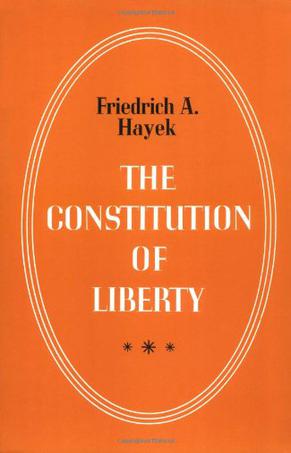-

The Road to Serfdom
In the last years of World War II, Friedrich Hayek wrote The Road to Serfdom. He warned the allies that policy proposals which were being canvassed for the post-war world ran the risk of destroying the very freedom for which they were fighting. On the basis of 'as in war, so in peace', economists and others were arguing that the government should plan all economic activity. Such planning, Hayek argued, would be incompatible with liberty, and had been at the very heart of the movements that had established both communism and Nazism. On its publication in 1944, the book caused a sensation. Neither its British nor its American publisher could keep up with demand, owing to wartime paper rationing. Then, in 1945, Reader's Digest published The Road to Serfdom as the condensed book in its April edition. For the first and still the only time, the condensed book was placed at the front of the magazine instead of the back. Hayek found himself a celebrity, addressing a mass market. The condensed edition was republished for the first time by the IEA in 1999 and has been reissued to meet the continuing demand for its enduringly relevant and accessible message. -

The Road to Serfdom
-

The Constitution of Liberty
"One of the great political works of our time, . . . the twentieth-century successor to John Stuart Mill's essay, 'On Liberty.'"?Henry Hazlitt, Newsweek "A reflective, often biting, commentary on the nature of our society and its dominant thought by one who is passionately opposed to the coercion of human beings by the arbitrary will of others, who puts liberty above welfare and is sanguine that greater welfare will thereby ensue."?Sidney Hook, New York Times Book Review In this classic work Hayek restates the ideals of freedom that he believes have guided, and must continue to guide, the growth of Western civilization. Hayek's book, first published in 1960, urges us to clarify our beliefs in today's struggle of political ideologies. -

The Road to Serfdom
The Road to Serfdom remains one of the all-time classics of twentieth-century intellectual thought. For over half a century, it has inspired politicians and thinkers around the world, and has had a crucial impact on our political and cultural history. With trademark brilliance, Hayek argues convincingly that, while socialist ideals may be tempting, they cannot be accomplished except by means that few would approve of. Addressing economics, fascism, history, socialism and the Holocaust, Hayek unwraps the trappings of socialist ideology. He reveals to the world that little can result from such ideas except oppression and tyranny. Today, more than fifty years on, Hayek's warnings are just as valid as when The Road to Serfdom was first published. -

周德伟论哈耶克
周德伟系华人学界为数不多的哈耶克的亲传弟子,他不仅是一位自由主义者,而且还是一位现代的儒生,他对于西方自由主义的观念、理论和制度,不仅独尊哈耶克所指征的古典的自由主义一脉,而且贯彻了中国传统文化的义理与精神,在他看来,西方的自由理论与中国的“圣学”不但不相隔膜,而且具有内在的关联。因此,周德伟的典范意义在于,作为自由主义者,他融会进了传统文化;作为儒生,他接引进了自由主义思想。这一典范,在本书中有着最鲜明的体现。 -

知识分子为什么反对市场
自由市场大幅度地改进了世界各地民众的生活境遇,然而,那么多的知识分子鄙视、厌恶甚至憎恨自由市场。为什么?哈耶克、诺齐克、弗里德曼、斯蒂格勒、布坎南等当代最杰出的政治哲学家和经济学家诊这种奇怪的心理症状。